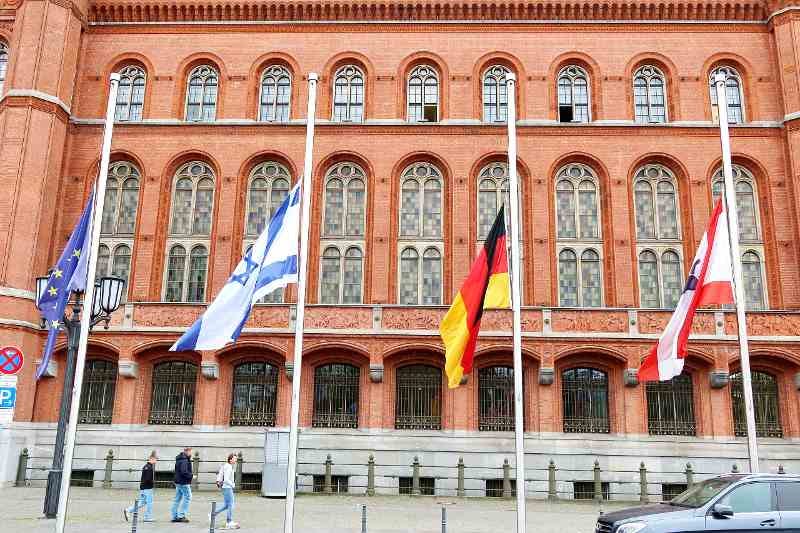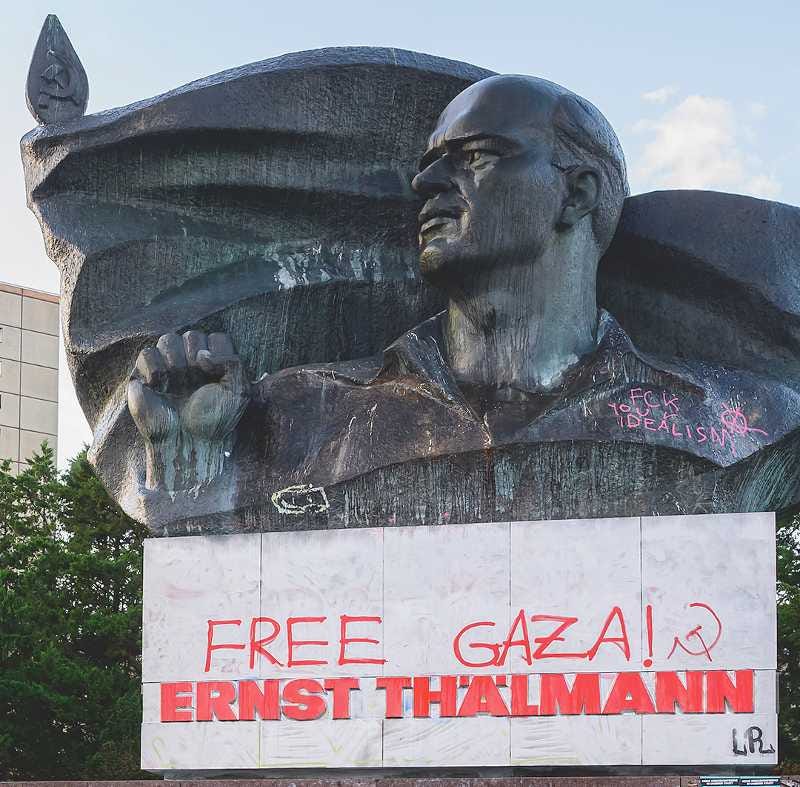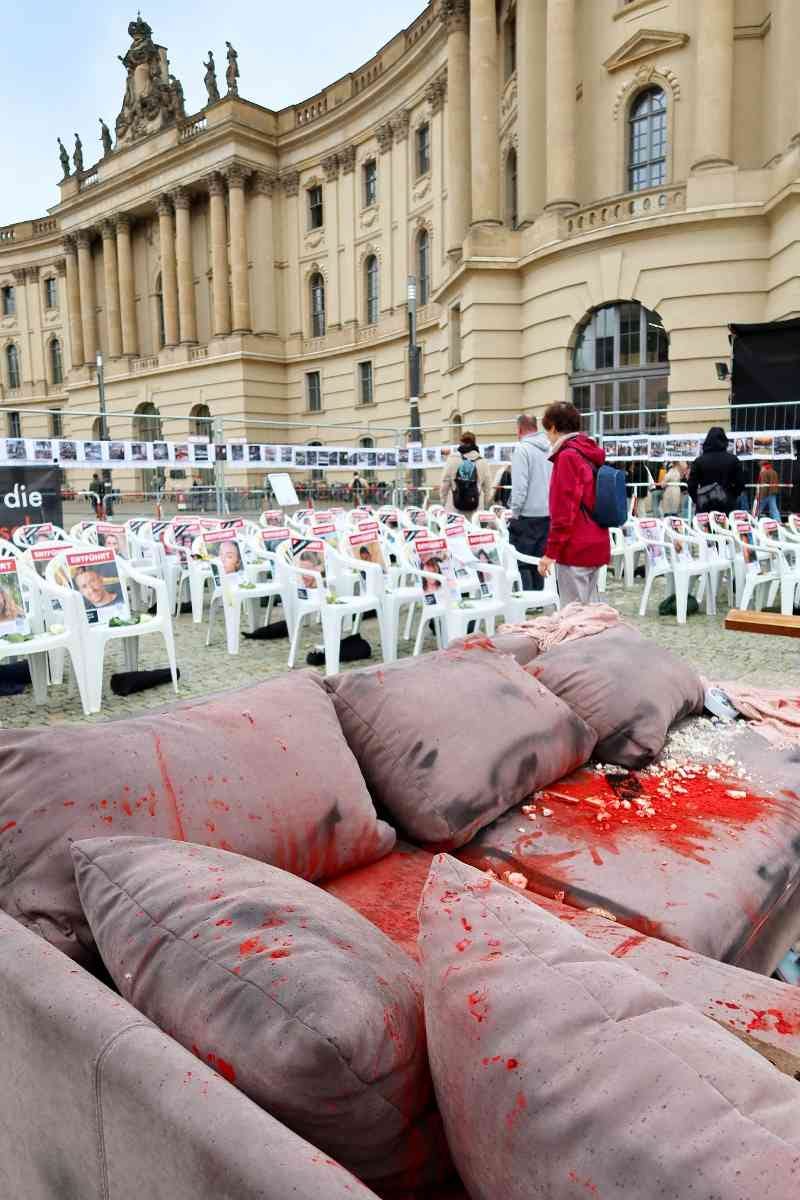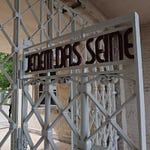What can be added to the flood of words - some pathetic, some ambiguous - that flowed across Europe yesterday and today on the anniversary of 7 October? What more can be said to convey the atmosphere here in Berlin in these suspended days?
Today, flags are flying at half-mast on all public buildings in the city. When it comes to symbolic gestures, Germany is unrivalled in Europe. Tonight, President Steinmeier has attended an ecumenical service in memory of the pogrom victims. Chancellor Olaf Scholz predictably recorded a video statement yesterday.
What about substance - both human and political? Since yesterday, Berlin's walls have been covered with spray-painted slogans calling for 'Free Gaza' and 'Free Palestine'. Pro-Palestinian demonstrations, repeatedly authorised in the hope that they would be peaceful, were again broken up by the police on Saturday and Sunday. Predictably, these rallies quickly shifted from calls for Palestinian "freedom" to advocacy of Israel's destruction and expressions of solidarity with Hezbollah, the Islamic Republic and Hamas. This development follows a familiar pattern: incitement to racial hatred, calls for genocide and support for terrorist organisations banned in Germany - all criminal offences. Such a result is hardly surprising.
Then there are the GDR-DDR nostalgics - self-proclaimed true pacifists who still fondly remember the state whose foundation is celebrated on 7 October, coinciding with Vladimir Putin's birthday. These nostalgics have revived their old solidarity with Palestine by waving Palestinian flags. One such flag-waver is my neighbour, a practising Catholic. This might be acceptable if the Israeli and Lebanese flags were flying next to him, because a true Catholic should be committed to universal peaceful coexistence. But no - when it comes to Israel, when it comes to Jews, peace is never universal.
A few hundred metres from my home stands a famous East Berlin monument: the colossal head of Ernst Thälmann, founder of the German Communist Party (KPD). A hero in his own right, deserving some respect. And yet last night the base of the statue was defaced with the red triangle symbol of Hamas - the new swastika - and the slogan 'Free Gaza'. This has happened twice in the space of a year: December 2023 and October 2024.
It's comforting to think that Europe's only problem with anti-Semitism is 'imported' from Arab countries via migrants. But that's not the case. It's comforting to think that those who defaced Thälmann's statue were poorly integrated second- or third-generation children of immigrants. But that's not true either. The area is predominantly inhabited by native German youths who, unlike migrants, are well aware of Thälmann's identity.
It's convenient to believe that our European leaders - Macron, Baerbock and others - are exerting pressure and criticism "for Israel's own good". To some extent this is true. But to give credibility to our criticism, we must first face up to what's happening on our own streets and in our offices in Berlin.
A year ago, colleagues from the company's self-proclaimed Arab community offered me Arab sweets in an office I visited. At the time, I didn't ask what they were celebrating. Later I realised it was Monday, 9 October 2023. They were commemorating the events of the previous weekend. In the same offices, being openly Israeli or Jewish is discouraged - a reality that predates 7 October. Notably, this attitude comes not from Arab colleagues, but from German, French, Bulgarian and Italian ones.
Berlin, we have a problem - right here among us. This problem exists regardless of how Israel conducts its war - well, badly, disproportionately, or perhaps in the only way possible. It's a war that Israel didn't start, and one in which, unlike in 2001, none of us have sought to engage as a united Western front. We've left Israel to deal with it on its own, or with some US support. Europe? Absent, except for Baerbock's fruitless trips and Josep Borrell's often counterproductive statements as the EU's foreign policy representative.
Let's go back to Berlin, the heart of Europe. Here and now, instead of endlessly reciting "Never Again Is Now" like a Virgin Mary's novena, we must face the reality of a resurgent, eternal anti-Semitism. This hatred sometimes masquerades as anti-Zionism, sometimes not.
In a lengthy editorial today (in German, paywalled) Matthias Döpfner, CEO of Axel Springer - which owns Bild, Welt, Politico and Business Insider - tackles the issue head-on and delves into its roots:
The eternal anti-Semite has haunted the world for centuries [...] and is now experiencing its politically correct revival in the woke movement at universities and elsewhere. Where does this come from? And what is the cause of woke and non-woke, right-wing, left-wing and Islamist anti-Semitism? The shortest and most succinct answer has four letters: envy.
In his book "Why the Germans? Why the Jews?" the German historian Götz Aly reveals how deeply anti-Semitism is rooted in this corrosive envy. Aly describes how, for centuries, envy has been directed not only at the outward successes of the Jews, but at something deeper, more ancient - a culture, a religion, a history that has endured for millennia.
Envy. While not a new concept - and at times bordering on the idealisation of Jewish qualities - Döpfner intelligently encapsulates decades of European historiography. He reminds us that all persecuted peoples forced into exile cultivate a resilience that manifests itself in intellectual, cultural and entrepreneurial prowess. It is this struggle for survival that makes us strong - a notion that may irk proponents of 'woke' culture and those who glorify victimhood. The result? The Jewish minority's record of achievement defies proportionality, which has been - and remains - a source of envy and rejection.
From these roots to today, the thesis of the editorial is crystal clear: the people on our streets don't really care about the Palestinians or the Middle East. Instead, they care about their idea of victimhood - an idea fuelled by the self-hatred of the white upper classes, including in Germany:
In recent years, the weak have become increasingly morally elevated. The strong - usually a man who is powerful, rich or successful - is seen as inherently immoral, suspect and dangerous, a potential oppressor.
Everyone aspires to be a victim. Victims are perceived as morally superior because they stand in opposition to the perpetrators, who are usually patriarchal in power. This almost creates a race for victimisation.
This mindset is the only explanation for the global perception of the Middle East conflict. Israel, a country of about 22,000 square kilometres - about the size of Mecklenburg-Western Pomerania - with almost ten million people, is labelled the aggressive Goliath. Meanwhile, the non-democratic countries in the region, such as Lebanon, Syria, Iraq, Iran, Yemen and others - covering some three million square kilometres with a population of around 200 million, and exploiting the two million Palestinians in the Gaza Strip - are seen as the defenceless David. If it were really about humanitarian aid for the victims, countries like Saudi Arabia, Jordan and Egypt would have plenty of space to take in Palestinians. But they don't.
In this upside-down world, Döpfner proposes to move beyond the very German "symbol politics" - the flags, banners, slogans and Sunday speeches - and urges Germany to take a real step towards inclusion - or reparation. Germany, a country famously fixated on naturalisation (which it recently amended to allow more people to become German in less time), should introduce new rules for preferential naturalisation of Jewish immigrants. This isn't entirely new; Germany temporarily implemented similar measures in the 1990s, after the collapse of the Soviet Union, for the so-called contingents of jewish soviet citizens - many of them Ukrainians - who chose Germany over Israel. Döpfner concludes:
Rabbi Leo Baeck wrote a sad sentence after his liberation from the Theresienstadt concentration camp in 1945: "For us Jews in Germany, a historical epoch has come to an end. (...) We believed that the German and Jewish spirit could meet on German soil and become a blessing through their union. This was an illusion - the era of the Jews in Germany is over once and for all.
It would be one of the most beautiful things in history if the great thinker were to be proved wrong on this point. For the Germany of German-Jewish symbiosis, of cultural and economic prosperity between 1871 and 1933, was the best Germany that ever existed.
Modern patriotism means: Germany must become more Jewish again.
Nothing of the sort is going to happen, I'm sure. But I believe that a phrase like "Make Germany Jewish again" beats all the vague, worn-out statements about "Jewish life belongs to Germany, alongside Islam, etc.".
This is Berlin on 7 October 2024.
P.s. The video I've posted is a montage of photos I took at Bebelplatz. On 10 May 1933, the largest German book burning took place here, carried out by students in front of the Humboldt University. Since yesterday, and for the next two weeks, an installation in the middle of the square shows a kibbutz living room after the Hamas attack on 7 October. Behind it, 101 chairs represent the hostages - living and dead - still being held by Hamas. Next to it is a reconstruction of a Gaza tunnel where the hostages were hidden.
"Where they burn books, they will eventually burn people,"
wrote the German-Jewish poet Heinrich Heine in 1820.
In Bebelplatz today, the two memorials stand face to face: one for the books burned, the other for the people killed. It is from here that Germany's soul must reawaken, introspect and find answers. Mathias Döpfner has given his answer. Other perspectives are possible. But one thing remains crystal clear: any serious European response to persistent anti-Semitism must come from this place, this city, this country.
Music credits.
Words from the 11th century Mahzor Vitry ● Music composed by Abie Rotenberg ● Recorded and Mixed by Eyal Pik ● Choral arrangement by Richard Hills ● Instrumentals arrangement by the band Directed by Alisdair Livingstone Director of Photography - Jonathan Stow Edited by Giovanni LaRosa ● Thanks to the West London Synagogue (YT Video here)
WORDS: אַחֵינוּ כָּל בֵּית יִשְׂרָאֵל הַנְּתוּנִים בְּצָרָה וּבַשִּׁבְיָה הָעוֹמְדִים בֵּין בַּיָּם וּבֵין בַּיַּבָּשָׁה הַמָּקוֹם יְרַחֵם עֲלֵיהֶם וְיוֹצִיאֵם מִצָּרָה לִרְוָחָה וּמֵאֲפֵלָה לְאוֹרָה וּמִשִּׁעְבּוּד לִגְאֻלָּה הַשְׁתָּא בַּעֲגָלָא וּבִזְמַן קָרִיב
TRANSLITERATION Acheinu kol beit Yisrael han'tunim b'tza-ra u’va-shivyah, ha-omdim bein ba-yam u’vein ba-ya-basha. Hamakom y'racheim aleihem, v'yotzi’eim mitzara lir’vacha, umei'afei’lah l'orah, umi’shibud lig'ulah, hashta ba-a-gala u’vizman kariv.
ENGLISH TRANSLATION: Our family, the whole house of Israel those who are in distress, or in captivity, those who stand either in the sea or on dry land. May the Omnipresent have mercy on them, and take them out from their narrow confines to open relief, and from darkness to light, and from oppression to redemption, now, speedily, and soon.
















Share this post